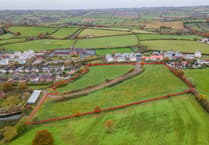THE Café Church service at Crediton Methodist Church on September 21 was led by Abigail Hardiman.
In another in the series “Out of Obscurity”, Abigail spoke about Barnabas. We think of him as Pail’s sidekick, but he did have a pivotal role in the early church.
In Acts 4 we hear of Joseph, a Levite. Joseph had real commitment to the Apostles and he put his money where his mouth was.
Levites did not normally have property and relied on the support of others. Joseph sells the little property he has and gives the money in order to support the early church. He believed in it passionately.
The Apostles saw something in him and named him Barnabas, Son of Encouragement.
What a difference an encouraging attitude or a lack of one can make. Barnabas’s name could be “discernment and prophecy” and the Apostles came to trust him.
In the Bible we often see people given new names to reflect aspects that God wants to bring out or to reflect what would happen on their faith journey.
Being an encourager was really central to Barnabas’s life as a follower of Jesus.
His role was huge. Barnabas felt that the Holy Spirit required it from him. That very encouragement made him a risk taker.
How many of us would have believed enough in someone who had had people stoned and imprisoned? Would we introduce him into our homes and our families?
The Apostles, themselves forgiven by Jesus many times for their mistakes, said it is too dangerous to take Saul but Barnabas, the encourager, stuck his neck out and said the man had truly changed.
Such was the respect that the elder statesmen of the church had for Barnabas that they listened to him.
When the Apostles began to realise that the good new about Jesus was spreading much wider than the Jewish community, it was Barnabas that they turned to for help.
Barnabas sees that Paul, with his background and skills, could be central to his mission to the Gentiles. Barnabas came from Cyprus, has a connection with the Greek world and is a Jew, a Levite and a follower of Jesus. A man of many parts. He sees this in Paul, a newly converted Jewish Roman citizen. Barnabas can see how together they can speak to people in different communities and he takes him out on this first missionary journey.
What would the church be like without Barnabas listening to the prompting of the Spirit? Perhaps without Barnabas playing his part, we might not have had Paul.
It is interesting that Barnabas and Paul later become Paul and Barnabas as the encourager slips into second place.
Abigail said her dad used to come home and complain that things in the office did not work out and people who had got it wrong. Her mum used to ask who had he praised and built up that day? Who had he encouraged? It is easy to be a nay sayer.
We need to play our part in building people up better and stronger and that is rarely through criticism and so much more through encouragement.
Abigail gave thanks for the encouragers in our lives, the people who have taken the time to build us up, to keep us going through doubts and difficulties.
The final reading in Acts 15 takes place after agreement was reached amongst the church leaders that the non-Jewish converts to Christ did not have to follow Jewish rules such as circumcision and paved the way to inclusivity.
Maybe we might not be here today without the work of Barnabus and Paul in the Gentile communities.
Barnabas and Paul were due to visit various of the churches they had founded. Barnabas wanted to take his nephew John Mark with them but Paul refused.
John Paul had let them down before and Paul did not want this to happen again. Barnabas took a stand and insisted that John Mark went with him. With that decision, Barnabas disappears into obscurity.
We see John Mark again in Timothy and even perhaps as the writer of the Gospel of Mark. Had Barnabas not encouraged him and fought for him, we may never have that that Gospel.
We need to encourage each other, to allow for others’ mistakes and realise that we are all part of the same mission, sharing the love of God.
There may be some wisdom about how to disagree well. Our society is so divided and there is a danger that people with strong convictions cannot work together.
We hear about Barnabas in Paul’s later epistles. We don’t know how they reconciled but Abigail’s money is on Barnabas being the one who had skills to re-build relationships.
In our divided communities it is a reminder that we need to find the things to unite us and, like Paul and Barnabas, to have a commitment to sharing the Gospel.
Bronwyn Nott





Comments
This article has no comments yet. Be the first to leave a comment.